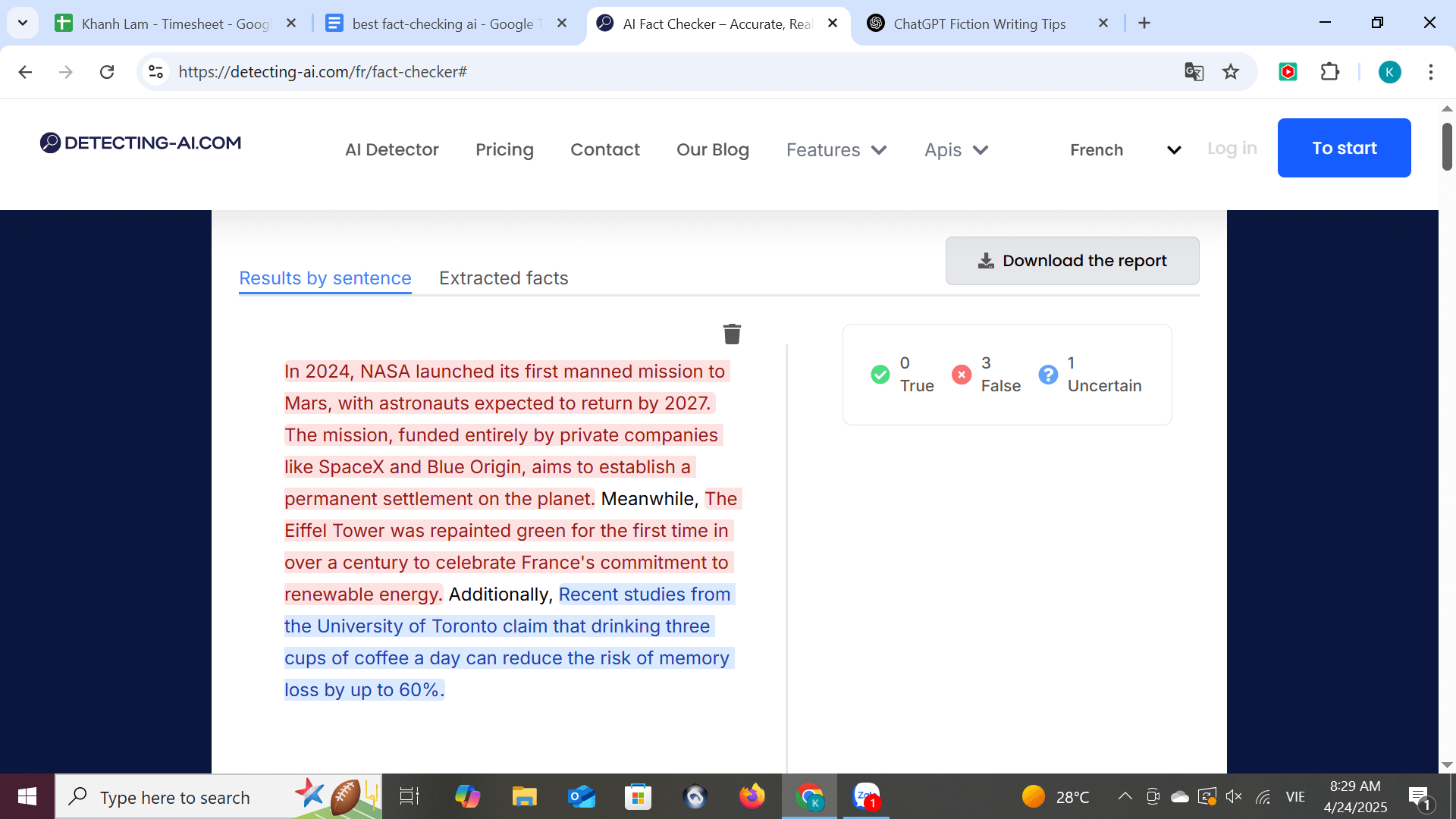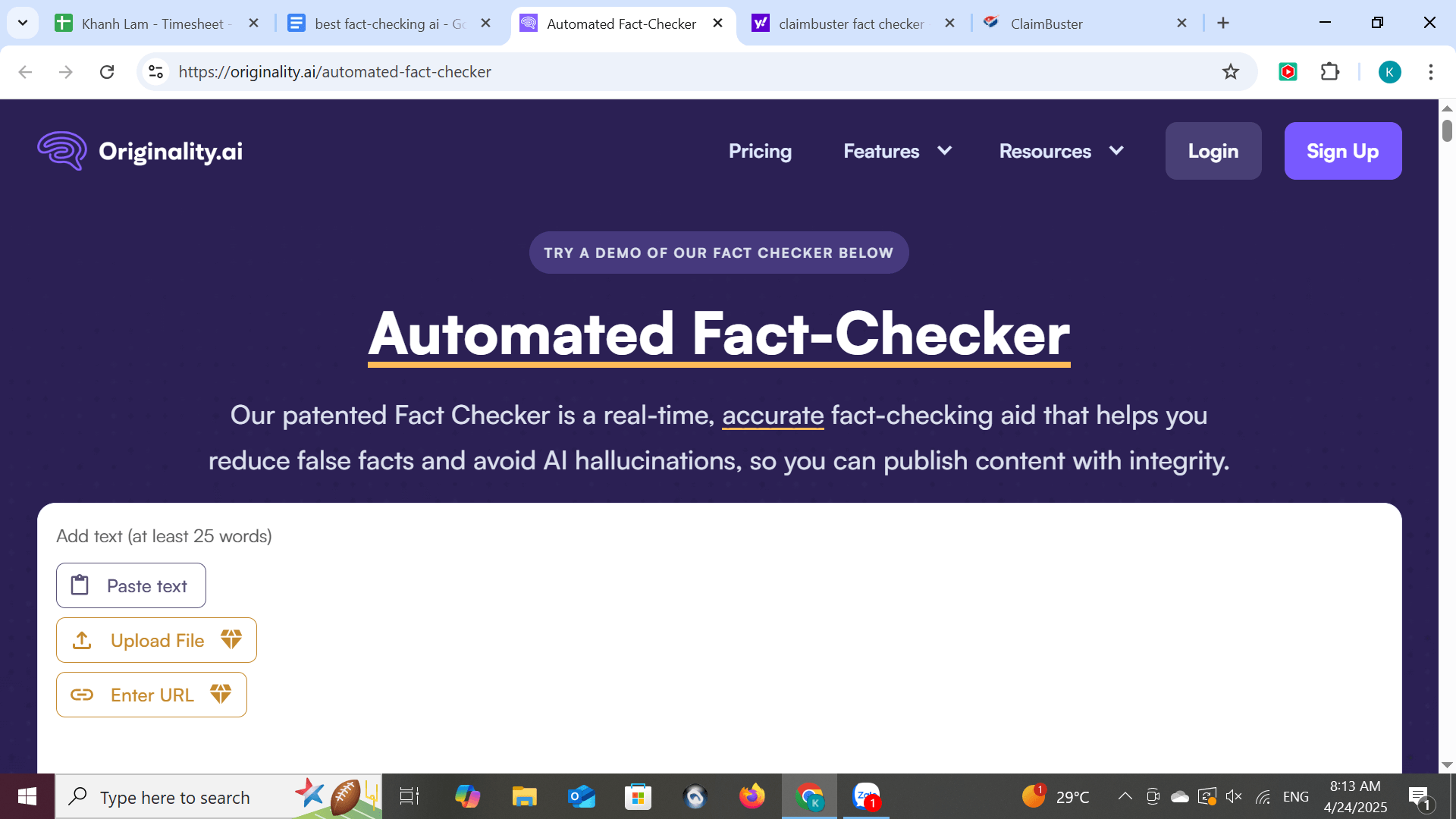
Worried you’re going to create an article with misinformation with AI-generated articles all over the place? Anyone who publishes content on the web—marketers, writers, journalists, business owners—needs an AI fact-checking tool! This article explores the best fact-checking AI tools of 2025, including Originality AI, ClaimBuster, and the Snopes API. Each tool will be evaluated on features, accuracy, and integrations so you can determine the best entry to keep your work trusted and safe.

AI Fact Checker Tool Interface
Nothing is more critical than accuracy for any fact-checking AI. A system could be the best in the world, but if it either does not recognize or admit to lies or fails to cite respected, verifiable sources, then it’s all for naught. Resources like Snopes API or ClaimBuster are of legit higher quality because they either have access to a cache of checked claims from over time, or resources that allow lateral reading and cross-referencing from less reputable pages to well-known sites and ensure that reliable URLs are used.
Misinformation spreads rapidly, which is why the ability to process information and return results in real time is necessary. For example, today’s misinformation tools rely on machine learning algorithms and NLP (natural language processing) to ascertain where information is incorrect and, within seconds, return results based on the understanding that people do not have time to wait for human processing to arrive at conclusions.
Integration with content production applications (i.e., Google Docs, WordPress, CMS) is essential. For instance, Originality AI is an application that integrates directly into one’s content generation workflow so that fact-checking can take place as content is being generated, as opposed to having to come back to it after generation is complete, which runs the risk of publishing content that has been proven untrue.
Originality AI is a broad fact-checking tool that finds misinformation as you go along and then checks whether or not AI-written material is accurate. With a browser extension and more, this is best for teams churning out a lot of written content. This relies upon link verification and the credibility of sources, as well as AI-trained models and historical fact databases.
Key Features:
| Pros | Cons |
| ✅ Real-time accuracy checks
✅ Detects AI-generated content ✅ Ideal for SEO and editorial teams ✅ Supports team collaboration |
❌ Requires subscription for full features
❌ May flag nuanced or emerging facts as inaccurate |

Originality AI Fact-Check Tool Interface
ClaimBuster was created by the University of Texas at Arlington to determine whether or not something is plausible or fabricated. It scans your work for factual claims and compares it to a vetted database to let you know if what you’re writing is accurate. It’s common among journalists and researchers, integrating easily into any editorial room. It relies on trained algorithms assessing known, politically fact-checked claims and real-life public speeches.
Key Features:
| Pros | Cons |
| ✅ Efficient integration for editorial teams
✅ Provides reliable fact-checking data ✅ Supports political content verification ✅ Easy-to-use interface for journalists |
❌ Limited to fact-checking claims in specific fields (politics, media)
❌ May not cover niche topics extensively |

ClaimBuster Fact-Checking Tool Interface and Homepage
Snopes is a long-time industry leader for fact-checking. Its API allows developers and writers to automatically connect to the extensive library of Snopes archives for claim verification. With categories for fact-checking and extensive explanations behind its determinations from “True” to “Mostly True” and, oftentimes, “Pants on Fire,” it lends credibility to any automated fact-checking effort.
Key Features:
| Pros | Cons |
| ✅ Trusted, well-known source in fact-checking
✅ Wide range of claim categories ✅ Detailed background on each fact-check ✅ Integrates easily with various content management systems |
❌ Limited to fact-checking content—doesn’t cover other forms of data
❌ No support for real-time claim updates |

Snopes API Library
Now that AI tools are more accessible, so are intentions gone awry. Articles, images, and AI-generated videos can add up to hoaxes and misinformation with an almost effortless process. As per Articulate, the amount of generative content created is not scalable beyond human intervention, leading to the development of automatic tools. To combat this, leveraging the best fact-checking AI has become increasingly important to ensure the accuracy of information.
Generating articles that are incorrect or intentionally misleading creates a cost, and that’s without it being AI-generated. The challenge when incorrect information is generated by websites or web pages is that other search engines will penalise them.
AI-generated content websites got a bad reputation, and so did AI-generated sites/companies/people who had other articles written about them. Using an AI-generated fact-checker can save you from a potential catastrophe.
AI fact-checking tools are necessary for the content creator, the journalist, the educator, and the small business owner. As AI-generated content increases and professional regulatory agencies pay closer attention, relying on the best fact-checking AI tools like Originality AI, ClaimBuster, and Snopes APU will save your name and credibility and make sure your work is compliant.
Those that have access to reputable, large databases and fact-checking, like the Snopes API or Originality AI.
Cross-reference the output with trusted fact-checking sites, use lateral reading techniques, and utilize AI tools that cite sources.
Try to get ChatGPT to source its information and then check those sources by hand on fact-checking sites like Snopes or independent resources.
Use multiple fact-checking resources to assess the same question. Assess citations for accuracy, relevance, recency, and domain authority.

